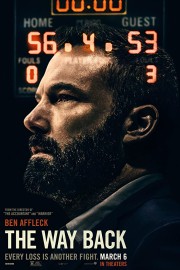The Way Back
Gavin O’Connor has made an interesting evolution through the sports movie genre. In 2004, he went the very traditional underdog route with a rousing Disney look at the 1980 US Olympic Hockey team with Kurt Russell in “Miracle.” In 2011, he focused more on the personal rivalry between brothers in the fantastic “Warrior,” and directed Nick Nolte to an Oscar nomination as an alcoholic father. Now, he meshes the two approaches together into “The Way Back,” which seems like it’s going to be an underdog story about a high school basketball team, but it’s just as much a look at an alcoholic man drowning in his misery, and how the opportunity to prove himself as a coach gives him something to fight for. It also has the best performance Ben Affleck, whose personal life has seen similar turmoil, has given since “Gone Girl.”
Affleck’s character, Jack Cunningham, is a construction worker whose life has involved work and booze since his young son died. He’s estranged from family and his ex-wife, and he’s barely hanging on. One day, a priest from his former high school comes to offer him a job as the head basketball coach; the assistant (Al Madrigal, who’s very good in the role) is unable to take on the added responsibilities, but he can get Jack up to speed on the team. At first, it’s obvious he’s sneaking drinks, and his constant profanity puts him on thin ice with the school, but eventually, they all get in sync, and the team starts to win, with their first chance at the playoffs since Jack played. When personal tragedy strikes again, it’s a precarious balance to keep Jack going the right way to a healthier life.
This was a very personal film for Affleck, whose been struggling with alcoholism and other emotional issues in his real life, and he brings that sense of weight and sadness to the role, really digging into the pain and rage in a performance that is among his best ever. He’s working again with O’Connor, who directed him in “The Accountant,” and it’s a fruitful collaboration. As a well-documented fan of the underdog sports genre, I appreciated the ways this leaned into it when it comes to theme and story, and also the way it slows down the action to focus on the characters and building the story around them. That results in a very languid pace, but one befitting the story being told, because it’s not as much about the big game, but the lessons learned along the way, and how Cunningham starts to find his way back to a healthy, happy life. That’s worth cheering on every time.










